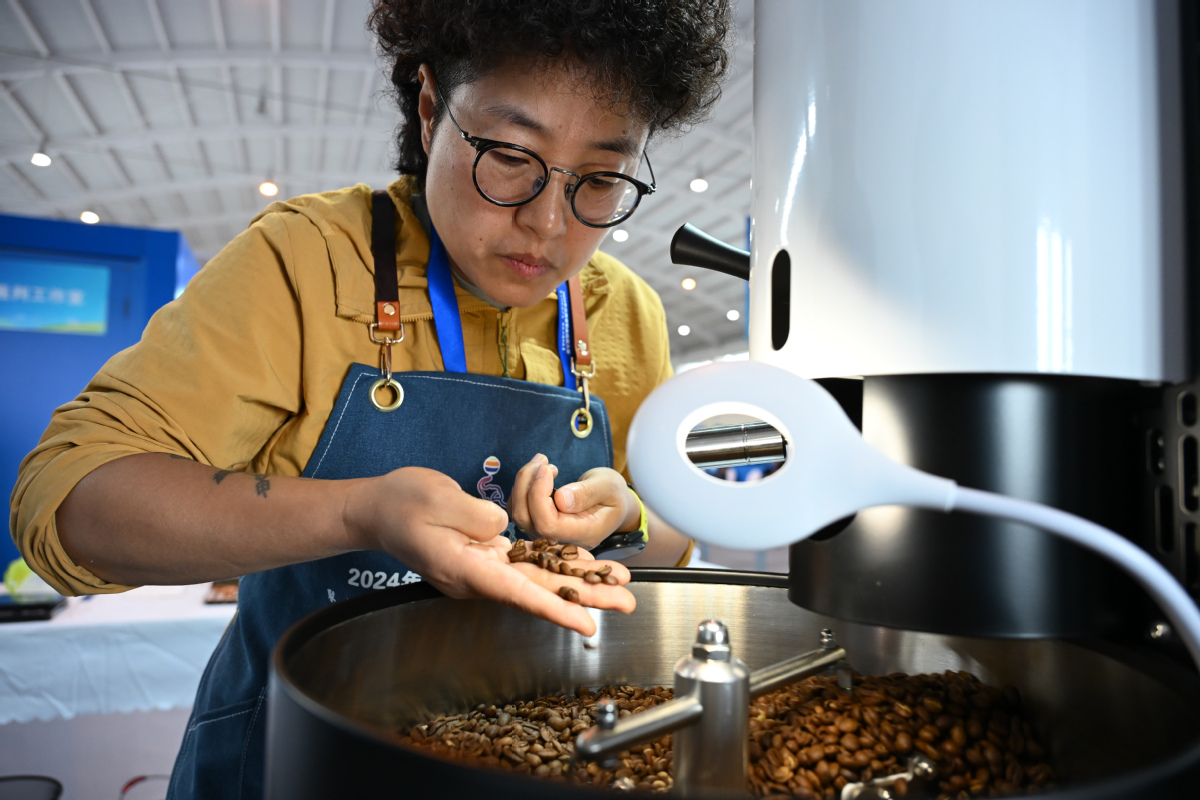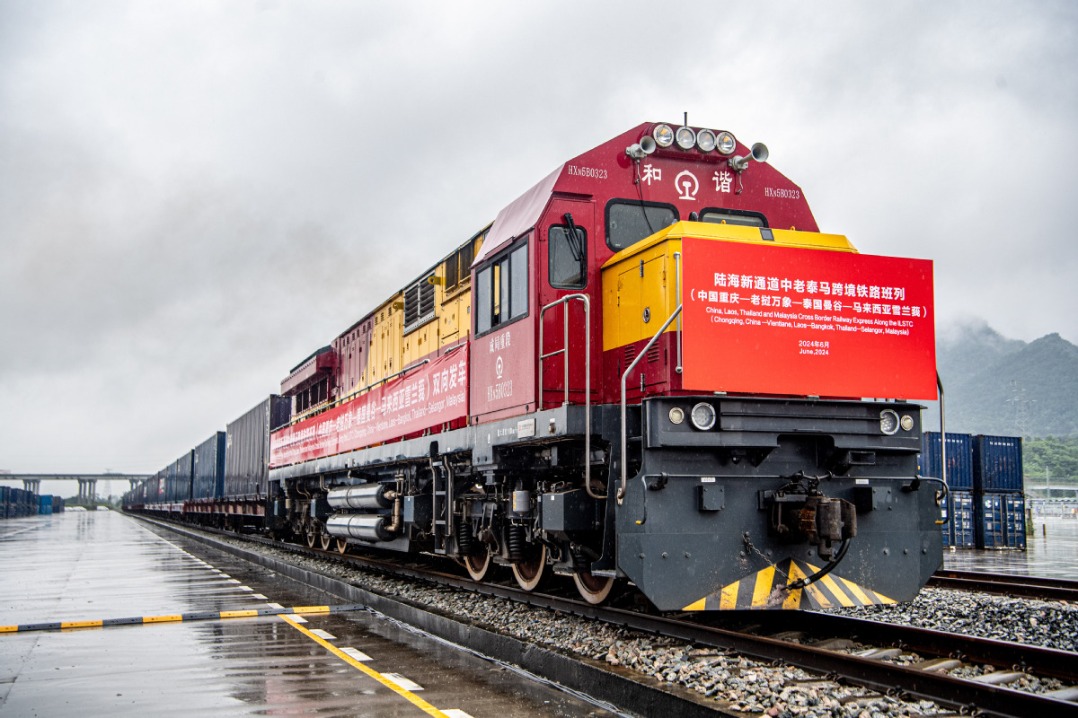Coffee market bubbles as brands tweak strategy
Partnerships with retailers, investing in supply chains to support faster outlet expansion


Major players in China's growing coffee market are pivoting their strategies in order to stay competitive.
Shifting away from price-focused tactics to a quality-driven approach, brands like Cotti Coffee, Luckin Coffee, Tims China and Starbucks are finding unique ways to capture market share in a rapidly expanding sector.
The World Federation of Chinese Catering Industry recently released its "China Coffee Industry Report 2024", highlighting the robust growth of the nation's coffee market and its shifting consumption patterns.
Coffee cultivation in China is centered in Yunnan province, producing just over 100,000 metric tons annually. However, with demand outstripping domestic supply, coffee imports saw a 20 percent year-on-year growth in 2023, totaling 150,000 tons valued at nearly 6 billion yuan ($840.6 million).
According to the report, China's coffee consumption has surged by 167 percent over the past decade, reaching 350,000 tons. Freshly ground and retail coffee has emerged as leading categories, with freshly ground coffee accounting for a market value of over 120 billion yuan and the total coffee market exceeding 150 billion yuan.
This growth aligns with an increasing shift toward freshly ground coffee, which is expected to rise from a 40 percent market share to over 80 percent in the near future.
Cotti Coffee, one of the fastest-growing coffee chains in China, recently announced an ambitious expansion plan to operate 50,000 stores by 2025, up from the current 10,000.
To reach this milestone, the chain aims to open 40,000 new locations within the next 18 months. This massive scale-up depends heavily on collaborations with 51 local retailers and catering partners, including convenience store operator Meiyijia, which had operated more than 33,000 chain stores in the country by 2023, burger and chicken restaurant chain Wallace, electronics store Suning, and budget hospitality chain Home Inn.
These partners bring more than 100,000 retail locations across the country into the fold, helping Cotti gain significant reach in both urban and rural markets.
In addition to partnerships, Cotti Coffee is investing in its supply chain infrastructure to support this rapid expansion. The company is building factories and enhancing store operations systems to ensure scalability and consistent service quality.
According to CEO Li Yingbo, Cotti plans to stick with its low-price strategy for at least three years, hoping to capture a larger share of the Chinese market by appealing to budget-conscious consumers.
"The 9.9 yuan strategy will remain at least for three years," Li told Foodic, a food and beverage sector portal.
However, Cotti stands nearly alone in embracing this low-cost model even as other brands shift toward a quality-first approach.
This shift underscores the difficulty of sustaining profit margins through low pricing alone, especially given the high operational costs associated with coffee production and retail.
"The low-price strategy is difficult for coffee companies to sustain. Without profits, there's no room for service, innovation, or customer engagement, which ultimately means no sales or margins," said Zhu Danpeng, an independent food and beverage analyst.
Luckin Coffee, once known for its aggressive pricing, is now moving toward quality-focused operations.
The company quickly captured market attention with quality coffee priced at 9.9 yuan, significantly below market rates. This strategy helped Luckin become one of China's largest coffee chains, with "cheap and delicious" becoming a catchphrase among consumers.
However, as Luckin's footprint grew and market competition intensified, the brand started feeling the financial strain of its low-price model.
Luckin's second quarter financial results highlighted these changes. Net revenue reached 8.403 billion yuan, marking a 35.5 percent increase year-on-year.
However, the brand faced challenges with a same-store sales decline of 20.9 percent for self-operated stores. This reflects the impact of shifting away from a low-price strategy in an increasingly competitive market.
Realizing that price cuts could only drive growth for so long, Luckin has begun to scale back on its low-price promotions. Instead, the company is refining its supply chain and quality control to position itself as a high-quality, value-driven brand.
To support this transition, Luckin has invested heavily in its sourcing network.
In July 2024, it opened its 20,000th store in Beijing. The company sources coffee beans from top-producing regions worldwide, including Brazil, Ethiopia and Yunnan, ensuring that customers receive a consistent and high-quality product.
In June, Luckin signed agreements to purchase 120,000 tons of coffee beans from Brazil through 2025.
Luckin has also strengthened its processing capabilities, with a Green Coffee Bean Processing Plant in Baoshan, Yunnan, and roasting plants in Jiangsu and Fujian provinces that give it an annual roasting capacity of 45,000 tons. With a 3 billion yuan investment in a new Innovation and Production Center in Qingdao, Shandong province, Luckin plans to further expand its roasting capacity to 55,000 tons, integrating its supply chain to fuel long-term growth.
While Luckin and Cotti rely on rapid expansion, Tims China has opted to stay out of the pricing battle, focusing instead on quality and value-driven combo offers. With 907 stores across 71 cities, Tims China provides a value proposition through set meal offerings that combine coffee with freshly prepared food, said the company.




































